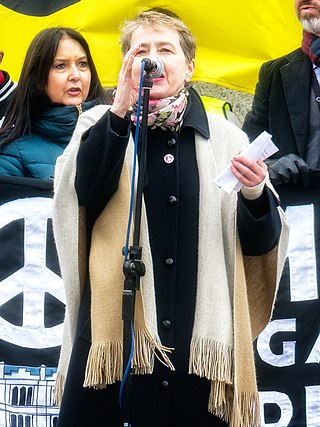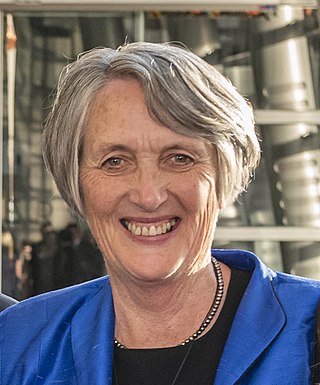
Nuclear disarmament is the act of reducing or eliminating nuclear weapons. Its end state can also be a nuclear-weapons-free world, in which nuclear weapons are completely eliminated. The term denuclearization is also used to describe the process leading to complete nuclear disarmament.

A number of peace symbols have been used many ways in various cultures and contexts. The dove and olive branch was used symbolically by early Christians and then eventually became a secular peace symbol, popularized by a Dove lithograph by Pablo Picasso after World War II. In the 1950s the "peace sign", as it is known today, was designed by Gerald Holtom as the logo for the British Campaign for Nuclear Disarmament (CND), a group at the forefront of the peace movement in the UK, and adopted by anti-war and counterculture activists in the US and elsewhere. The symbol is a superposition of the semaphore signals for the letters "N" and "D", taken to stand for "nuclear disarmament", while simultaneously acting as a reference to Goya's The Third of May 1808 (1814).

The Nuclear Disarmament Party (NDP) was an Australian political party formed in June 1984. It was founded by medical researcher Michael Denborough as the political arm of the Australian anti-nuclear movement, which had been active since the early 1970s.

Helen Mary Caldicott is an Australian physician, author, and anti-nuclear advocate. She founded several associations dedicated to opposing the use of nuclear power, depleted uranium munitions, nuclear weapons, nuclear weapons proliferation, and military action in general.

Bruce Kent was a British Roman Catholic priest who became a political activist in the Campaign for Nuclear Disarmament, and held various leadership positions in the organisation.

The World Peace Council (WPC) is an international organization with the stated goals of advocating for universal disarmament, sovereignty and independence and peaceful co-existence, and campaigns against imperialism, weapons of mass destruction and all forms of discrimination. Founded from an initiative of the Information Bureau of the Communist and Workers' Parties, WPC emerged from the bureau's worldview that divided humanity into Soviet-led "peace-loving" progressive forces and US-led "warmongering" capitalist countries. Throughout the Cold War, WPC operated as a front organization as it was controlled and largely funded by the Soviet Union, and refrained from criticizing or even defended the Soviet Union's involvement in numerous conflicts. These factors led to the decline of its influence over the peace movement in non-Communist countries. Its first president was the French physicist and activist Frédéric Joliot-Curie. It was based in Helsinki, Finland from 1968 to 1999, and since in Athens, Greece.
European Nuclear Disarmament (END) was a Europe-wide movement for a "nuclear-free Europe from Poland to Portugal” that put on annual European Nuclear Disarmament conventions from 1982 to 1991.
Peggy Duff was a British political activist who started off her career with a protest against the treatment of German prisoners of war in Britain after the Second World War. She was principally known for her contribution to the peace movement as the organiser of the Campaign for Nuclear Disarmament. Duff was described by Noam Chomsky, a friend of hers, as "one of the people who really changed modern history".

Katharine Jane Hudson is a British left-wing political activist and academic who is the General Secretary of the Campaign for Nuclear Disarmament (CND) and Media Officer of Left Unity. She served as Chair of CND from 2003 to 2010 and has been an officer of the Stop the War Coalition since 2002.
The Coalition for Peace Through Security (CPS) was a campaigning group founded in September 1981 and active in the UK throughout the early and mid-1980s. It strongly opposed unilateral nuclear disarmament and withdrawal from NATO as advocated by the Campaign for Nuclear Disarmament, supporting instead the replacement of Polaris by Trident and the deployment of NATO cruise missiles after the Soviet Union began deploying its SS20 missiles in 1977. The basis of the CPS case was set out in detail in a book published towards the end of the campaign, Paul Mercer's "Peace" of the Dead, and many of its arguments at the time can still be found on the website of Julian Lewis, formerly its Research Director.

The International Campaign to Abolish Nuclear Weapons is a global civil society coalition working to promote adherence to and full implementation of the Treaty on the Prohibition of Nuclear Weapons. The campaign helped bring about this treaty. ICAN was launched in 2007. In 2022, it counted 661 partner organizations in 110 countries.

Campaign for Nuclear Disarmament (NZ) was co-founded in Christchurch, New Zealand in 1959 with the help of Elsie Locke and Mary Woodward. Mabel Hetherington, who belonged to an earlier generation of peace activists from England, was largely responsible for setting up the organization in Auckland when she moved to New Zealand after World War II. With Alison Duff and Pat Denby, Hetherington carried it in Auckland through the 1960s. It was largely from the Campaign for Nuclear Disarmament (NZ) and the Peace Media that Greenpeace New Zealand evolved.
In 1984, Prime Minister David Lange banned nuclear-powered or nuclear-armed ships from using New Zealand ports or entering New Zealand waters. Under the New Zealand Nuclear Free Zone, Disarmament, and Arms Control Act 1987, territorial sea, land and airspace of New Zealand became nuclear-free zones. This has since remained a part of New Zealand's foreign policy.
April Carter was a British peace activist. She was a political lecturer at the universities of Lancaster, Somerville College, Oxford and Queensland, and was a Fellow at the Stockholm International Peace Research Institute from 1985 to 1987. She is currently an Honorary Research Fellow of the Centre for Peace and Reconciliation Studies, Coventry University, and a 'senior editor' on the international editorial board for the International Encyclopedia of Peace to be published by Oxford University Press.
Anti-nuclear organizations may oppose uranium mining, nuclear power, and/or nuclear weapons. Anti-nuclear groups have undertaken public protests and acts of civil disobedience which have included occupations of nuclear plant sites. Some of the most influential groups in the anti-nuclear movement have had members who were elite scientists, including several Nobel Laureates and many nuclear physicists.

A peace movement is a social movement which seeks to achieve ideals such as the ending of a particular war or minimizing inter-human violence in a particular place or situation. They are often linked to the goal of achieving world peace. Some of the methods used to achieve these goals include advocacy of pacifism, nonviolent resistance, diplomacy, boycotts, peace camps, ethical consumerism, supporting anti-war political candidates, supporting legislation to remove profits from government contracts to the military–industrial complex, banning guns, creating tools for open government and transparency, direct democracy, supporting whistleblowers who expose war crimes or conspiracies to create wars, demonstrations, and political lobbying. The political cooperative is an example of an organization which seeks to merge all peace-movement and green organizations; they may have diverse goals, but have the common ideal of peace and humane sustainability. A concern of some peace activists is the challenge of attaining peace when those against peace often use violence as their means of communication and empowerment.
The Soviet Peace Committee was a state-sponsored organization responsible for coordinating peace movements active in the Soviet Union. It was founded in 1949 and existed until the fall of the Soviet Union in 1991.

The Campaign for Nuclear Disarmament (CND) is an organisation that advocates unilateral nuclear disarmament by the United Kingdom, international nuclear disarmament and tighter international arms regulation through agreements such as the Nuclear Non-Proliferation Treaty. It opposes military action that may result in the use of nuclear, chemical or biological weapons and the building of nuclear power stations in the UK.
The Nuclear Freeze campaign was a mass movement in the United States during the 1980s to secure an agreement between the U.S. and Soviet governments to halt the testing, production, and deployment of nuclear weapons.

Catherine Frances Dewes is a New Zealand activist for disarmament and former advisor on peace matters to two United Nations Secretaries-General. She was appointed an Officer of the New Zealand Order of Merit in the 2001 New Year Honours, for services to the peace movement.










